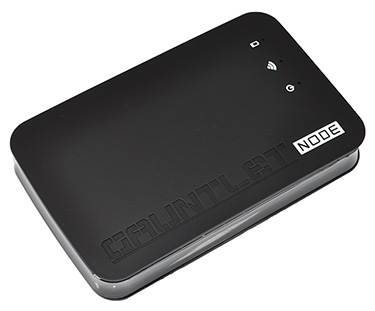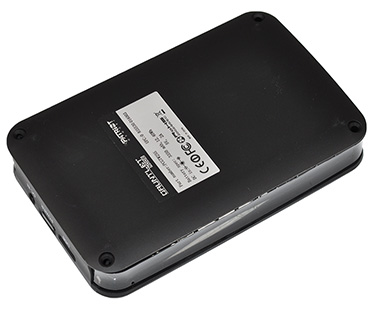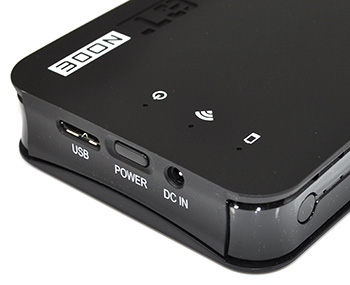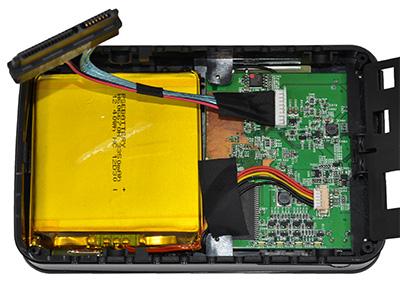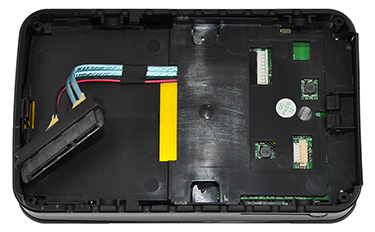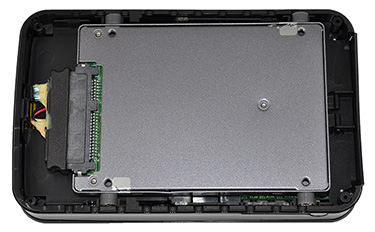Introduction
Got an iPhone? An iPad? Or one of the many other smartphones that lack a built-in option for expandable storage? Then pay attention, as Patriot's Gauntlet Node is designed exclusively for you.
The portable wireless storage enclosure, priced at £80, is one of the latest attempts at offering extra on-the-go storage for your mobile device. Sound familiar? That's because pocket-sized wireless storage has been done before - we examined Kingston's Wi-Drive around this time last year - yet Patriot is trying to do things a little differently. While Kingston's solution integrates up to 64GB of flash storage in an ultra-slim form factor, Patriot has taken more of a DIY approach; the Gauntlet Node is shipped as an enclosure for the user to add their own 2.5in drive.
Being able to add your own choice of drive has obvious benefits - you get to decide on performance and capacity - but there are downsides, too. The Gauntlet Node, measuring 8.62cm x 13.9cm x 2.44cm in size, isn't as sleek as the Kingston Wi-Drive and feels quite chubby. It's still easy to carry around in a bag, and of course can offer far greater capacity than the Flash-based Wi-Drive, but you'd have a hard time squeezing it into a pocket. It's an obvious trade-off, some competitors offer a smaller, sleeker packager, but Patriot's larger solution offers greater flexibility.
The Gauntlet Node does have a few extra tricks up its sleeve, too. In addition to offering the requisite Wi-Fi 802.11 b/g/n radio, it also integrates USB 3.0 connectivity, allowing it to double as a swift external storage device. The internal SATA 3Gbps interface will limit maximum performance somewhat, but when equipped with a 256GB Samsung 830 Series SSD we managed to saturate the drive interface by hitting sequential read speeds of 285MB/s.
There isn't a great deal of note on the outside of the enclosure, with all of the buttons and LEDs positioned on or near the right-hand side. Patriot provides status LEDs for battery, wireless and power, while the I/O selection includes the USB 3.0 connector, a central power button and a jack for the bundled mains adapter. There's also a battery-life indicator along the side of the Node; hold the button and the four LEDs illuminate to indicate how much charge you have left.
Sliding the lid away and pulling out the drive tray reveals the rechargeable 12.4Wh Lithium-ion battery that's said to be good for 5.5 hours of use, alongside a small PCB that contains a Ralink wireless controller and small memory chip that's used to store Patriot's firmware.
The design is simple enough, though it's worth remembering that battery life will vary depending on configuration and usage scenario. The Gauntlet Node is officially capable of streaming multimedia content to up to eight devices simultaneously, but attaching multiple devices will impact battery life, as will the choice of 2.5in drive.
Using a low-power SSD should provide greater longevity than a mechanical hard disk, you would think, so to put a real-world slant on battery life, we equipped the enclosure with a Samsung SSD and used it to stream music to a single iPad for six-and-a-half hours. Battery life in this scenario is actually in excess of Patriot's quoted figure, though we do wish the accompanying iPad app would provide a precise indication of time remaining. The status LEDs on the device itself give you an idea of charge level, but we'd rather have the software tell us we have 'x amount of minutes' remaining.
Drive installation is nice and easy, with Patriot providing four rubber mounts that screw into the disk and then rest on predefined standoffs. Re-attaching the Node's top cover is as simple as sliding it into place, and if you choose to do so, there's an option to screw the lid shut to ensure that it doesn't pop open.
Patriot's mostly-plastic hardware doesn't have the premium feel of its rivals - we'd really liked to have seen a metal chassis considering the £80 price point - but the combination of USB 3.0 and Wireless-N suggests that it'll serve up data to mobile devices particularly well. Though, not without a hiccup or two...






